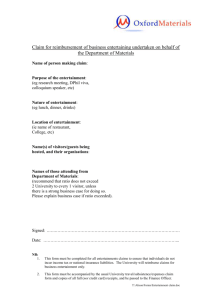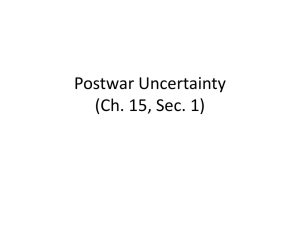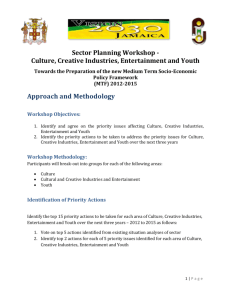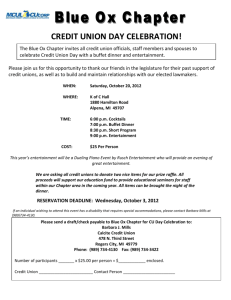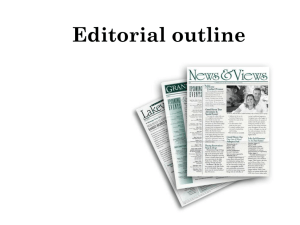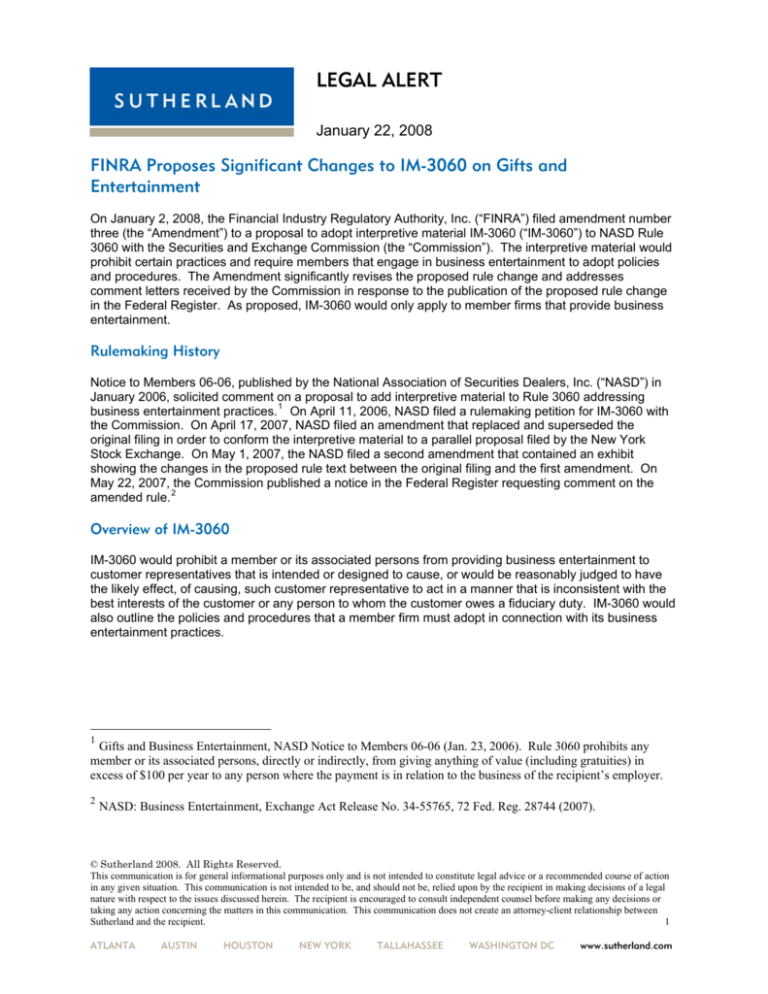
LEGAL ALERT
January 22, 2008
FINRA Proposes Significant Changes to IM-3060 on Gifts and
Entertainment
On January 2, 2008, the Financial Industry Regulatory Authority, Inc. (“FINRA”) filed amendment number
three (the “Amendment”) to a proposal to adopt interpretive material IM-3060 (“IM-3060”) to NASD Rule
3060 with the Securities and Exchange Commission (the “Commission”). The interpretive material would
prohibit certain practices and require members that engage in business entertainment to adopt policies
and procedures. The Amendment significantly revises the proposed rule change and addresses
comment letters received by the Commission in response to the publication of the proposed rule change
in the Federal Register. As proposed, IM-3060 would only apply to member firms that provide business
entertainment.
Rulemaking History
Notice to Members 06-06, published by the National Association of Securities Dealers, Inc. (“NASD”) in
January 2006, solicited comment on a proposal to add interpretive material to Rule 3060 addressing
business entertainment practices. 1 On April 11, 2006, NASD filed a rulemaking petition for IM-3060 with
the Commission. On April 17, 2007, NASD filed an amendment that replaced and superseded the
original filing in order to conform the interpretive material to a parallel proposal filed by the New York
Stock Exchange. On May 1, 2007, the NASD filed a second amendment that contained an exhibit
showing the changes in the proposed rule text between the original filing and the first amendment. On
May 22, 2007, the Commission published a notice in the Federal Register requesting comment on the
amended rule. 2
Overview of IM-3060
IM-3060 would prohibit a member or its associated persons from providing business entertainment to
customer representatives that is intended or designed to cause, or would be reasonably judged to have
the likely effect, of causing, such customer representative to act in a manner that is inconsistent with the
best interests of the customer or any person to whom the customer owes a fiduciary duty. IM-3060 would
also outline the policies and procedures that a member firm must adopt in connection with its business
entertainment practices.
1
Gifts and Business Entertainment, NASD Notice to Members 06-06 (Jan. 23, 2006). Rule 3060 prohibits any
member or its associated persons, directly or indirectly, from giving anything of value (including gratuities) in
excess of $100 per year to any person where the payment is in relation to the business of the recipient’s employer.
2
NASD: Business Entertainment, Exchange Act Release No. 34-55765, 72 Fed. Reg. 28744 (2007).
© Sutherland 2008. All Rights Reserved.
This communication is for general informational purposes only and is not intended to constitute legal advice or a recommended course of action
in any given situation. This communication is not intended to be, and should not be, relied upon by the recipient in making decisions of a legal
nature with respect to the issues discussed herein. The recipient is encouraged to consult independent counsel before making any decisions or
taking any action concerning the matters in this communication. This communication does not create an attorney-client relationship between
Sutherland and the recipient.
1
ATLANTA
AUSTIN
HOUSTON
NEW YORK
TALLAHASSEE
WASHINGTON DC
www.sutherland.com
A.
Key Definitions
The requirements of IM-3060 rest on a number of important definitions.
The Amendment would define “customer” as:
A person that maintains a business relationship with a member via the maintenance of an
account, through the conduct of investment banking, or pursuant to other securities-related
activity; or a person whose customer representative receives business entertainment for the
purpose of encouraging such person to establish a business relationship with a member by
opening an account with the member or by conducting investment banking or other securitiesrelated activity with the member.
The Amendment would define “customer representative” as:
A person who is an employee, officer, director, or agent of a customer, unless such person is a
family member of the customer.
The Amendment would expand the definition of “family member” to include grandparents, grandchildren,
aunts and uncles, cousins, nieces and nephews (in addition to parents, mother-in-laws, father-in-laws,
spouses, brothers, sisters, brother-in-laws and sister-in-laws, son-in-laws, daughter-in-laws, and children).
FINRA explains in the Amendment that the definition would expand since these additional familial
relationships are unlikely to present the conflict of interests the proposed rule seeks to address.
The Amendment would add a definition of “institutional customer” as:
A customer that meets the definition of “institutional account” in Rule 3110(c)(4). 3
FINRA is proposing to introduce the definition of “institutional customer” to limit the application of
certain provisions of the proposed rule to business entertainments provided to large accounts,
since such accounts present a greater risk of abusive business entertainment practices than the
risks posed by small accounts.
The Amendment would revise the definition of “business entertainment” to be:
Any social event, hospitality event, sporting event, entertainment event, meal, leisure activity, or
event of like nature or purpose regarding an existing or prospective customer relationship,
including business entertainment offered in connection with a charitable event, educational event
or business conference, as well as any transportation or lodging related to such activity or event,
in which an associated person of a member accompanies a customer representative.
FINRA explains in the Amendment that the new definition of “business entertainment” would include only
those activities or events that relate to “an existing or prospective customer relationship.” FINRA provides
3
Rule 3110(c)(4) defines “institutional account” as: (A) a bank, savings and loan association, insurance company,
or registered investment company; (B) an investment adviser registered either with the Securities and Exchange
Commission under Section 203 of the Investment Advisers Act of 1940 or with a state securities commission (or any
agency or office performing like functions); or (C) any other entity (whether a natural person, corporation,
partnership, trust, or otherwise) with total assets of at least $50 million.
© Sutherland 2008. All Rights Reserved.
This article is for informational purposes and is not intended to constitute legal advice.
ATLANTA
AUSTIN
HOUSTON
NEW YORK
TALLAHASSEE
2
WASHINGTON DC
www.sutherland.com
additional flexibility by permitting member firms to take into account factors such as the type and identity
of customers receiving the business entertainment and the business unit providing such entertainment
works in designing policies and procedures and determining whether an activity or event is “business
entertainment.”
The “business entertainment” definition would codify FINRA’s long-standing position that an associated
person of a member must accompany or participate in an event in order for it to be deemed business
entertainment, as opposed to a gift. However, under the Amendment, IM-3060 would recognize an
exception where there are exigent circumstances. The May 22, 2007 Federal Register notice elaborates
on what qualifies as exigent circumstances (e.g., an associated person has a sick child, experiences an
accident or confronts some other sudden, overriding circumstance). All instances of exigent
circumstances would have to be clearly and thoroughly documented and subject to the prior written
approval of a designated supervisory person in very limited circumstances where such prior approval
cannot reasonably be obtained, a prompt post-event review be conducted and documented by such
supervisory person.
The Amendment emphasizes that that business entertainment that unexpectedly exceeds a member
firm’s threshold is not an exigent circumstance. In this respect, FINRA notes that member firms may
discipline associated persons for exceeding thresholds. Moreover, FINRA concludes its rules are not
necessarily violated where an associated person exceeds a firm’s internal requirements if the firm’s
policies and procedures are reasonably in accord with the purposes of the proposed rule and are adhered
to by the firm and its supervisors.
B.
Written Policies and Procedures for Business Entertainment
IM-3060 would require member firms to establish and implement written policies and procedures for
businesses entertainment provided to customer representatives of institutional customers that (1) define
the forms of business entertainment that are appropriate or inappropriate using quantitative and/or
qualitative standards addressing the nature and frequency of entertainment, the type and class of any
accommodation and transportation, and (2) impose either specific dollar limits on business entertainment
or require advance written supervisory approval. No hard limits would be imposed by IM-3060.
IM-3060 would require, with respect to business entertainment provided to customer representatives of all
customers, member firms to establish and implement written policies and procedures that:
detect and prevent business entertainment that is intended as, or could reasonably be perceived
to be intended as, an improper quid pro quo or that could otherwise give rise to a potential conflict
of interest or undermine the performance of a customer representative’s duty to a customer or
any person to whom the customer owes a fiduciary duty;
require appropriate training and education for all personnel who supervise, administer, or are
subject to the written policies and procedures; and
make clear that anything of value given or otherwise provided to a customer representative that
does not fall within the definition of “business entertainment” is a gift under Rule 3060.
A member’s written policies and procedures could distinguish, and set specifically tailored standards for,
business entertainment in connection with events that are deemed to be primarily educational, charitable,
or philanthropic in nature, as long as such standards comply with the requirements of the interpretation
and are explicitly addressed in the firm’s written policies and procedures.
© Sutherland 2008. All Rights Reserved.
This article is for informational purposes and is not intended to constitute legal advice.
ATLANTA
AUSTIN
HOUSTON
NEW YORK
TALLAHASSEE
3
WASHINGTON DC
www.sutherland.com
C.
Recordkeeping
IM-3060 would require a member firm to track business entertainment expenses provided to customer
representatives of institutional customers. The Amendment proposes to remove an exception that had
existed for recording expenses where the business expense and associated expenses are under $50 (or
where an additional expense in addition to a recorded business expense is less than $50). FINRA
explains in the Amendment that member firms can establish, as part of their written policies and
supervisory procedures, the de-minimis business expenses that will not be aggregated for purposes of
the firm’s business entertainment policies. The Amendment would also require member firms to promptly
make available to institutional customers any business entertainment records regarding business
entertainment provided to customer representatives of that institutional customer upon the institutional
customer’s written request.
D.
Exemption for Members with Business Entertainment Expenses Below $7,500
IM-3060 would provide a partial exemption for a member with annual business entertainment expenses
below $7,500. Such firms would not be subject to the proposed recordkeeping provisions or those
provisions requiring written policies and procedures for business entertainment provided to customer
representatives of institutional customers. The $7,500 limit would be measured on a fiscal year basis and
a member relying on the exemption would be required to maintain evidence demonstrating that its
business entertainment expenses were below the limit.
E.
Effective Date
The effective date of the proposed rule change under the Amendment would be one year following
Commission approval. FINRA will announce the effective date of the proposed rule change in a
Regulatory Notice to be published within 60 days following Commission approval.
If you are interested in more information about this development, or any of the services we provide,
please contact any of the following members of our Broker-Dealer Team:
Eric A. Arnold
Clifford E. Kirsch
Michael B. Koffler
Susan S. Krawczyk
Holly H. Smith
202.383.0741
212.389.5052
202.383.0106
202.383.0197
202.383.0245
eric.arnold@sablaw.com
clifford.kirsch@sablaw.com
michael.koffler@sablaw.com
susan.krawczyk@sablaw.com
holly.smith@sablaw.com
© Sutherland 2008. All Rights Reserved.
This article is for informational purposes and is not intended to constitute legal advice.
ATLANTA
AUSTIN
HOUSTON
NEW YORK
TALLAHASSEE
4
WASHINGTON DC
www.sutherland.com

